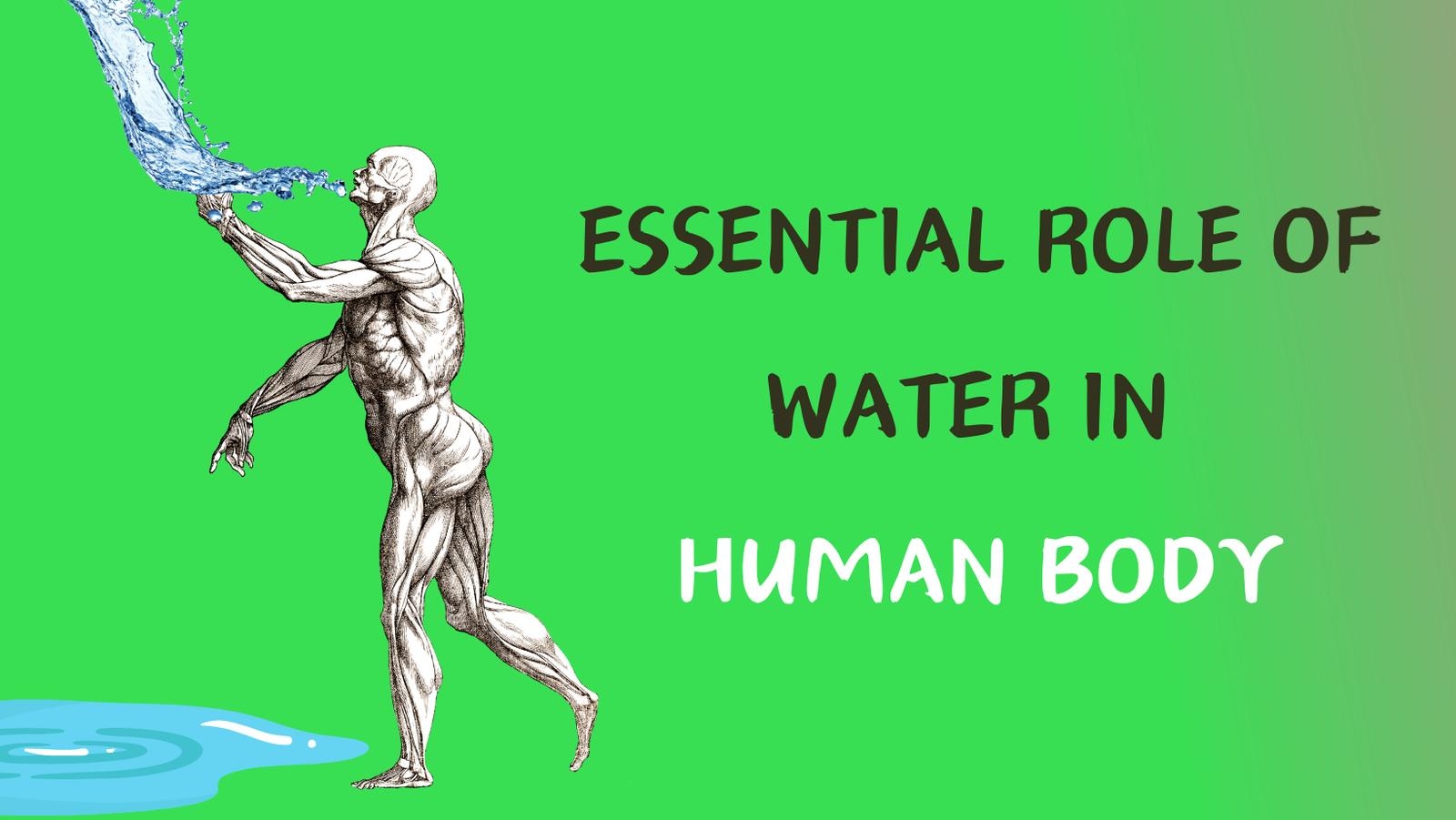The Essential Role of Water in the Human Body: An In-Depth Exploration
Water is often referred to as the elixir of life, a fitting title given its critical role in the human body. Comprising approximately 60% of an adult’s body weight, water is fundamental to various physiological processes. Understanding the importance of water, here i am telling the essential role of water in the human body and how it supports bodily functions, and the consequences of dehydration is crucial for maintaining optimal health. This comprehensive article explores the important role of water in the human body.
The Biological Necessity of Water and essential role of water in the human body
Water is indispensable for life, and its presence is essential for several biochemical reactions. Here are some key reasons why water is vital for human health:
1. Cellular Function
Water is a primary component of cells, making up around 70% of their content. It is essential for maintaining cell structure and integrity. In addition, water facilitates the transport of nutrients and oxygen to cells and the removal of waste products, ensuring cellular function and survival.
2. Temperature Regulation
The human body relies on water to regulate temperature through the process of sweating and evaporation. When the body overheats, sweat glands release water onto the skin’s surface. As this water evaporates, it cools the body, preventing overheating and maintaining a stable internal temperature.
3. Digestion and Nutrient Absorption
Water plays a critical role in digestion, starting from saliva production, which contains enzymes that initiate the breakdown of food. In the stomach, water helps dissolve food, enabling digestive enzymes to further process it. Throughout the intestines, water aids in the absorption of nutrients, ensuring that the body receives essential vitamins and minerals.
4. Joint Lubrication and Protection
Synovial fluid, found in the joints, is primarily composed of water. This fluid acts as a lubricant, reducing friction between cartilage surfaces during movement. Adequate hydration helps maintain this lubrication, preventing joint pain and promoting smooth and pain-free movement.
5. Waste Removal
The kidneys are essential for filtering blood and removing waste products through urine, a process heavily dependent on water. Adequate hydration ensures efficient kidney function and the elimination of toxins and waste from the body. It also helps prevent kidney stones and urinary tract infections.
6. Circulatory Health
Water is a major component of blood, which is about 90% water. Blood is responsible for transporting oxygen, nutrients, and hormones to various parts of the body. Adequate hydration maintains blood volume and viscosity, ensuring efficient circulation and cardiovascular health.
The Impact of Dehydration ( Importance of Water in human Body )
Dehydration occurs when the body loses more water than it takes in, leading to a deficiency that can have severe consequences. Here are some effects of dehydration:
1. Cognitive Impairment
Even mild dehydration can affect cognitive functions, leading to difficulties in concentration, short-term memory issues, and increased fatigue. Severe dehydration can result in confusion and impaired cognitive abilities, significantly impacting daily activities and overall quality of life.
2. Physical Performance
The importance of water in human body can be understand from from this, that Water is crucial for muscle function and energy metabolism. Dehydration can lead to muscle cramps, fatigue, and decreased endurance. For athletes and physically active individuals, maintaining hydration is essential for optimal performance and reducing the risk of heat-related illnesses.
3. Gastrointestinal Issues
Lack of water can lead to digestive problems such as constipation. Water helps keep the digestive system moving and prevents the hardening of stool. Chronic dehydration can result in more severe gastrointestinal disorders and discomfort.
4. Skin Health
Hydration is key to maintaining healthy skin. Dehydration can cause dry, flaky skin and reduce its elasticity, making it more prone to wrinkles and aging. Drinking adequate water helps keep the skin hydrated, promoting a youthful and healthy appearance.
5. Kidney Damage
Chronic dehydration can strain the kidneys, leading to the formation of kidney stones and other renal issues. Over time, this can cause significant damage and impair the kidneys’ ability to filter blood effectively.
Daily Water Intake Recommendations
The amount of water an individual needs can vary based on factors such as age, weight, activity level, and climate. However, general guidelines suggest:
-
- Men: Approximately 3.7 liters (or about 13 cups) of total water intake per day, from all beverages and foods.
-
- Women: Approximately 2.7 liters (or about 9 cups) of total water intake per day, from all beverages and foods.
To stay hydrated you need to understand the essential role of water in the human body clearly. These recommendations include all fluids consumed, including water, beverages, and water-rich foods like fruits and vegetables.
Tips for Staying Hydrated ( The importance of water in human body )
-
- Carry a Water Bottle: Having a reusable water bottle with you encourages regular drinking throughout the day.
-
- Eat Water-Rich Foods: Incorporate foods with high water content into your diet, such as cucumbers, oranges, and watermelons.
-
- Set Reminders: Use apps or alarms to remind yourself to drink water regularly.
-
- Drink Before Thirst Hits: Thirst is a late indicator of dehydration. Drink water at regular intervals to avoid getting thirsty.
-
- Monitor Urine Color: A pale yellow color generally indicates proper hydration, while darker urine can be a sign of dehydration.
Special Considerations
Certain populations may require special attention to their hydration needs, and they should be concerned about the essential role of water in the human body including:
1. Children
Children are more susceptible to dehydration due to their higher metabolic rate and greater surface area-to-body weight ratio. Ensuring they drink adequate fluids, especially during physical activity, is crucial.
2. Elderly
Older adults may have a diminished sense of thirst, making them more prone to dehydration. Encouraging regular fluid intake and monitoring hydration status in the elderly is important for their health.
3. Athletes
Athletes lose significant amounts of water through sweat during intense physical activity. They need to replace fluids lost during exercise to maintain performance and prevent heat-related illnesses.
4. Pregnant and Breastfeeding Women
Pregnant and breastfeeding women have increased water needs to support fetal growth and milk production. Ensuring they consume adequate fluids is essential for their health and the health of their babies.
Conclusion
Water is undeniably essential for human life, playing a critical role in various bodily functions. From cellular processes to temperature regulation, digestion, joint lubrication, waste removal, and circulatory health, water is integral to maintaining overall health and well-being. Understanding the importance of water and recognizing the signs of dehydration can help individuals make informed decisions about their hydration needs.
Staying hydrated is not merely a matter of quenching thirst; it is a fundamental aspect of health that supports physical performance, cognitive function, and disease prevention. By prioritizing water intake and adopting habits that promote hydration, individuals can enhance their quality of life and ensure their bodies function optimally. Hope you understand The Essential Role of Water in the Human Body.
मानव शरीर में पानी की महत्वपूर्ण भूमिका: एक गहन अन्वेषण
पानी को अक्सर जीवन का अमृत कहा जाता है, और यह उपयुक्त शीर्षक है क्योंकि यह शरीर के विभिन्न कार्यों में महत्वपूर्ण भूमिका निभाता है। एक वयस्क के शरीर के वजन का लगभग 60% पानी होता है, और यह कई शारीरिक प्रक्रियाओं के लिए बुनियादी है। पानी के महत्व को समझना, यह कैसे शारीरिक कार्यों का समर्थन करता है, और निर्जलीकरण के परिणामों को जानना बेहतर स्वास्थ्य बनाए रखने के लिए आवश्यक है। यह विस्तृत लेख मानव शरीर में पानी की महत्वपूर्ण भूमिका की पड़ताल करता है।
पानी की जैविक आवश्यकता
पानी जीवन के लिए अपरिहार्य है, और इसका अस्तित्व कई जैव रासायनिक प्रतिक्रियाओं के लिए आवश्यक है। यहाँ कुछ मुख्य कारण दिए गए हैं कि क्यों पानी मानव स्वास्थ्य के लिए महत्वपूर्ण है:
1. कोशिका कार्य
पानी कोशिकाओं का एक मुख्य घटक है, जो उनके लगभग 70% भाग में पाया जाता है। यह कोशिका संरचना और अखंडता बनाए रखने के लिए आवश्यक है। इसके अलावा, पानी कोशिकाओं तक पोषक तत्वों और ऑक्सीजन के परिवहन और अपशिष्ट उत्पादों के निष्कासन में मदद करता है, जिससे कोशिकाओं की कार्यक्षमता और अस्तित्व सुनिश्चित होता है।
2. तापमान नियंत्रण
मानव शरीर पसीने और वाष्पीकरण की प्रक्रिया के माध्यम से तापमान को नियंत्रित करने के लिए पानी पर निर्भर करता है। जब शरीर अधिक गर्म होता है, तो पसीना ग्रंथियां त्वचा की सतह पर पानी छोड़ती हैं। जब यह पानी वाष्पित होता है, तो यह शरीर को ठंडा करता है, अधिक गर्मी को रोकता है और एक स्थिर आंतरिक तापमान बनाए रखता है।
3. पाचन और पोषक तत्वों का अवशोषण
पानी पाचन में एक महत्वपूर्ण भूमिका निभाता है, जो लार उत्पादन से शुरू होता है, जिसमें ऐसे एंजाइम होते हैं जो भोजन के टूटने की प्रक्रिया शुरू करते हैं। पेट में, पानी भोजन को घोलने में मदद करता है, जिससे पाचन एंजाइम इसे और अधिक संसाधित कर सकते हैं। आंतों के माध्यम से, पानी पोषक तत्वों के अवशोषण में मदद करता है, यह सुनिश्चित करता है कि शरीर आवश्यक विटामिन और खनिज प्राप्त करता है।
4. जोड़ो की चिकनाई और सुरक्षा
सिनोवियल द्रव, जोड़ों में पाया जाता है, मुख्य रूप से पानी से बना होता है। यह द्रव एक स्नेहक के रूप में कार्य करता है, गति के दौरान उपास्थि सतहों के बीच घर्षण को कम करता है। उचित जलयोजन इस स्नेहन को बनाए रखने में मदद करता है, जोड़ों के दर्द को रोकता है और सहज और दर्द रहित गति को बढ़ावा देता है।
5. अपशिष्ट निष्कासन
किडनी रक्त को छानने और मूत्र के माध्यम से अपशिष्ट उत्पादों को हटाने के लिए आवश्यक हैं, जो एक प्रक्रिया है जो पानी पर बहुत निर्भर करती है। उचित जलयोजन प्रभावी किडनी कार्य और शरीर से विषाक्त पदार्थों और अपशिष्ट के निष्कासन को सुनिश्चित करता है। यह किडनी स्टोन और मूत्र संक्रमण को भी रोकने में मदद करता है।
6. संचलन स्वास्थ्य
पानी रक्त का एक प्रमुख घटक है, जो लगभग 90% पानी है। रक्त ऑक्सीजन, पोषक तत्वों और हार्मोनों को शरीर के विभिन्न भागों में ले जाने के लिए जिम्मेदार है। उचित जलयोजन रक्त की मात्रा और श्यानता को बनाए रखता है, जिससे कुशल परिसंचरण और हृदय स्वास्थ्य सुनिश्चित होता है।
निर्जलीकरण का प्रभाव ( मानव शरीर में पानी की महत्वपूर्ण भूमिका )
जब शरीर पानी की कमी का अनुभव करता है, तो निर्जलीकरण होता है, जिससे गंभीर परिणाम हो सकते हैं। निर्जलीकरण के कुछ प्रभाव निम्नलिखित हैं:
1. संज्ञानात्मक हानि
हल्का निर्जलीकरण भी संज्ञानात्मक कार्यों को प्रभावित कर सकता है, जिससे एकाग्रता में कठिनाई, अल्पकालिक स्मृति समस्याएँ, और थकान बढ़ सकती है। गंभीर निर्जलीकरण भ्रम और संज्ञानात्मक क्षमताओं में हानि का कारण बन सकता है, जो दैनिक गतिविधियों और समग्र जीवन की गुणवत्ता को काफी प्रभावित करता है।
2. शारीरिक प्रदर्शन
पानी मांसपेशियों के कार्य और ऊर्जा चयापचय के लिए महत्वपूर्ण है। निर्जलीकरण मांसपेशियों में ऐंठन, थकान, और सहनशक्ति में कमी का कारण बन सकता है। एथलीटों और शारीरिक रूप से सक्रिय व्यक्तियों के लिए, जलयोजन बनाए रखना इष्टतम प्रदर्शन और गर्मी-संबंधी बीमारियों के जोखिम को कम करने के लिए आवश्यक है।
3. Gastrointestinal समस्याएँ
पानी की कमी से पाचन समस्याएं हो सकती हैं, जैसे कब्ज। पानी पाचन तंत्र को गतिमान रखता है और मल के कठोर होने को रोकता है। पुराना निर्जलीकरण अधिक गंभीर गैस्ट्रोइंटेस्टाइनल विकारों और असुविधा का कारण बन सकता है।
4. त्वचा का स्वास्थ्य
जलयोजन स्वस्थ त्वचा बनाए रखने के लिए महत्वपूर्ण है। निर्जलीकरण शुष्क, परतदार त्वचा और लोच में कमी का कारण बन सकता है, जिससे झुर्रियों और उम्र बढ़ने की संभावना बढ़ जाती है। पर्याप्त पानी पीने से त्वचा को हाइड्रेटेड रखने में मदद मिलती है, जो एक युवा और स्वस्थ रूप को बढ़ावा देता है।
5.गुर्दे की क्षति
पुराना निर्जलीकरण गुर्दों पर तनाव डाल सकता है, जिससे किडनी स्टोन और अन्य गुर्दे की समस्याएं हो सकती हैं। समय के साथ, इससे महत्वपूर्ण क्षति हो सकती है और गुर्दे की रक्त को प्रभावी ढंग से छानने की क्षमता प्रभावित हो सकती है।
दैनिक जल सेवन की सिफारिशें
व्यक्ति को कितने पानी की आवश्यकता होती है, यह उम्र, वजन, गतिविधि स्तर और जलवायु जैसे कारकों के आधार पर भिन्न हो सकता है। हालांकि, सामान्य दिशानिर्देश सुझाव देते हैं:
-
- पुरुष: सभी पेय और खाद्य पदार्थों से प्रतिदिन लगभग 3.7 लीटर (या लगभग 13 कप) कुल पानी का सेवन।
-
- महिलाएं: सभी पेय और खाद्य पदार्थों से प्रतिदिन लगभग 2.7 लीटर (या लगभग 9 कप) कुल पानी का सेवन।
ये सिफारिशें सभी तरल पदार्थों को शामिल करती हैं, जिनमें पानी, पेय पदार्थ और पानी-समृद्ध खाद्य पदार्थ जैसे फल और सब्जियां शामिल हैं।
हाइड्रेटेड रहने के सुझाव
-
- एक पानी की बोतल साथ रखें: आपके पास एक पुन: प्रयोज्य पानी की बोतल होने से दिन भर नियमित रूप से पानी पीने के लिए प्रोत्साहन मिलता है।
-
- पानी-समृद्ध खाद्य पदार्थ खाएं: अपने आहार में उच्च पानी की मात्रा वाले खाद्य पदार्थों को शामिल करें, जैसे खीरे, संतरे, और तरबूज।
-
- रिमाइंडर सेट करें: खुद को नियमित रूप से पानी पीने की याद दिलाने के लिए ऐप्स या अलार्म का उपयोग करें।
-
- प्यास लगने से पहले पानी पीएं: प्यास निर्जलीकरण का एक देर से संकेतक है। प्यास लगने से पहले नियमित अंतराल पर पानी पीएं।
-
- मूत्र का रंग देखें: हल्का पीला रंग सामान्यतः उचित जलयोजन का संकेत देता है, जबकि गहरा मूत्र निर्जलीकरण का संकेत हो सकता है।
विशेष विचार
कुछ आबादी को उनके जलयोजन की जरूरतों पर विशेष ध्यान देने की आवश्यकता हो सकती है, जिनमें शामिल हैं:
1. बच्चे
बच्चे अपने उच्च चयापचय दर और वजन अनुपात के कारण निर्जलीकरण के प्रति अधिक संवेदनशील होते हैं। विशेष रूप से शारीरिक गतिविधि के दौरान यह सुनिश्चित करना कि वे पर्याप्त तरल पदार्थ पीते हैं, महत्वपूर्ण है।
2. बुजुर्ग
बुजुर्गों में प्यास की भावना कम हो सकती है, जिससे वे निर्जलीकरण के प्रति अधिक प्रवण हो जाते हैं। नियमित रूप से तरल पदार्थ का सेवन प्रोत्साहित करना और बुजुर्गों में जलयोजन की स्थिति की निगरानी करना उनके स्वास्थ्य के लिए महत्वपूर्ण है।
3. एथलीट
गहन शारीरिक गतिविधि के दौरान एथलीट पसीने के माध्यम से महत्वपूर्ण मात्रा में पानी खो देते हैं। उन्हें प्रदर्शन बनाए रखने और गर्मी-संबंधी बीमारियों को रोकने के लिए व्यायाम के दौरान खोए हुए तरल पदार्थों को बदलने की आवश्यकता होती है।
4. गर्भवती और स्तनपान कराने वाली महिलाएं
गर्भवती और स्तनपान कराने वाली महिलाओं को भ्रूण के विकास और दूध उत्पादन को समर्थन देने के लिए बढ़ी हुई जल की आवश्यकता होती है। यह सुनिश्चित करना कि वे पर्याप्त तरल पदार्थ का सेवन करती हैं, उनके स्वास्थ्य और उनके बच्चों के स्वास्थ्य के लिए आवश्यक है।
निष्कर्ष
पानी निस्संदेह मानव जीवन के लिए अत्यावश्यक है और यह शरीर के विभिन्न कार्यों में महत्वपूर्ण भूमिका निभाता है। कोशिका प्रक्रियाओं से लेकर तापमान नियंत्रण, पाचन, जोड़ों की चिकनाई, अपशिष्ट निष्कासन और संचलन स्वास्थ्य तक, पानी समग्र स्वास्थ्य और कल्याण को बनाए रखने में अभिन्न है। पानी के महत्व को समझना और निर्जलीकरण के संकेतों को पहचानना व्यक्तियों को उनके जलयोजन की आवश्यकताओं के बारे में सूचित निर्णय लेने में मदद कर सकता है।
हाइड्रेटेड रहना केवल प्यास बुझाने का मामला नहीं है; यह स्वास्थ्य का एक मौलिक पहलू है जो शारीरिक प्रदर्शन, संज्ञानात्मक कार्य और रोग की रोकथाम का समर्थन करता है। पानी का सेवन प्राथमिकता देकर और ऐसे आदतों को अपनाकर जो जलयोजन को बढ़ावा देती हैं, व्यक्ति अपने जीवन की गुणवत्ता को बढ़ा सकते हैं और यह सुनिश्चित कर सकते हैं कि उनके शरीर अनुकूल रूप से कार्य करें। आशा है कि आप मानव शरीर में पानी की महत्वपूर्ण भूमिका को समझ गए होंगे।



